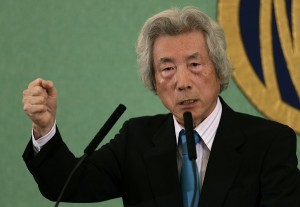Japan ex-leaders join calls against nuclear power

Former Japanese Prime Minister Junichiro Koizumi speaks during a press conference at the Japan National Press Club in Tokyo Tuesday, Nov. 12, 2013. Koizumi said Tuesday that the current prime minister, Shinzo Abe, should use his public popularity to “do the right thing.” Koizumi said that with Japan’s nuclear plants all offline for safety checks following the Fukushima disaster it would be easier to begin the phase-out soon. AP/Shizuo Kambayashi
TOKYO—Japan’s flagging anti-nuclear movement has gotten a boost from two former prime ministers who are speaking out in favor of phasing out atomic power following the disaster in Fukushima.
Former Prime Minister Junichiro Koizumi said Tuesday that the current prime minister, Shinzo Abe, should take advantage of his high public support and sway in parliament to “do the right thing.”
“Prime Minister Abe should use the power given to him to do what the majority of the people want,” Koizumi said in a speech at the Japan Press Club. “It can be achieved. Why miss this chance?”
Koizumi said that with Japan’s nuclear plants all offline for safety checks it would be easiest to begin the phase-out soon.
Abe favors restarting the nuclear plants under safety guidelines revised after multiple meltdowns in Fukushima following the March 2011 earthquake and tsunami, contending that resource-scarce Japan cannot afford not to. His government is drawing up a national energy policy that will likely reverse a commitment by the previous government to phase out nuclear power over the next two decades.
Article continues after this advertisementPolls have shown the majority of the public, worried over potential health risks from radiation, prefer to shift away from the nuclear plants that provided nearly a third of Japan’s power generation capacity before the accident at the Fukushima Dai-Ichi nuclear plant, the worst since the Chernobyl disaster in 1986.
Article continues after this advertisementEven within Abe’s Liberal Democratic Party, opinions over the future for nuclear power are divided.
Japan’s rapid turnover in leadership over the past two decades means there are plenty of former prime ministers. At least three, including Koizumi, have said they support ending use of nuclear power.
Their support could help reinvigorate the anti-nuclear movement, which has lost some of its vitality nearly three years after the Fukushima accident.
Another former prime minister, Morihiro Hosokawa, said in an interview published in the Tokyo Shimbun on Tuesday that he also favors an end to reliance on nuclear power.
“I can’t understand why they want restarts of the nuclear plants when there is no place to discard the nuclear waste,” Hosokawa said. “It would be a crime against future generations for our generation to restart nuclear plants without resolving this issue,” he said.
Koizumi likewise emphasized his concern over the lack of a safe way to dispose of nuclear waste, especially in a densely populated, land-scarce country such as Japan.
“I think it is too optimistic and irresponsible to assume we can find a final radioactive waste storage site in Japan, after the accident,” he said.
Burying it underground for 100,000 years, as is generally planned, runs the risk that future generations may find the waste and, not understanding the risks, end up being exposed to harmful radiation.
“What language should we use to convey the hazards to those people in the future?” he said.
___
Associated Press writer Mari Yamaguchi contributed to this report.